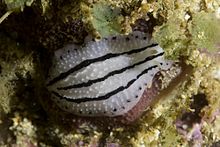Phyllidiopsis phiphiensis is a species of sea slug, a dorid nudibranch, a shell-less marine gastropod mollusk in the family Phyllidiidae.[2]
| Phyllidiopsis phiphiensis | |
|---|---|

| |
| The nudibranch Phyllidiopsis phiphiensis, Mirissa, Sri Lanka. | |
| Scientific classification | |
| Domain: | Eukaryota |
| Kingdom: | Animalia |
| Phylum: | Mollusca |
| Class: | Gastropoda |
| Order: | Nudibranchia |
| Superfamily: | Phyllidioidea |
| Family: | Phyllidiidae |
| Genus: | Phyllidiopsis |
| Species: | P. phiphiensis
|
| Binomial name | |
| Phyllidiopsis phiphiensis Brunckhorst, 1993[1]
| |
Distribution
editThis species was described from Phi Phi Island, southern Thailand. It has been reported from Myanmar, Sri Lanka and India, Kenya and the Maldives.[3][4]
Description
editThis nudibranch has a white dorsum with three longitudinal black lines interspersed with two raised ridges. It is a small Phyllidiid, growing to about 15 mm in length. There are black spots bordering the edge of the mantle. The rhinophores are white. It is similar to Phyllidiopsis xishaensis and Phyllidiopsis annae but has three instead of four longitudinal black lines on the mantle and different coloured rhinophores to Phyllidiopsis annae, which are black in that species.[3]
Diet
editThis species feeds on a sponge belonging to the genus Gellius.
References
edit- ^ Brunckhorst D.J. (1993) The systematics and phylogeny of phyllidiid nudibranchs (Doridoidea). Records of the Australian Museum suppl. 16: 1-108.
- ^ Bouchet, P. (2015). Phyllidiopsis phiphiensis Brunckhorst, 1993. In: MolluscaBase (2015). Accessed through: World Register of Marine Species on 2016-11-12.
- ^ a b Rudman, W.B., 1999 (August 1) Phyllidiopsis phiphiensis Brunckhorst, 1993. [In] Sea Slug Forum. Australian Museum, Sydney.
- ^ Kodiat E., (2016) Phyllidiopsis phiphiensis Brunckhorst, 1993 Nudi Pixel.